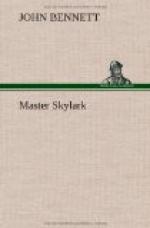They had now come through the garden to the Rose Theatre, where the Lord Admiral’s company played; and Carew was himself again. “Come, Nicholas,” said he, half jestingly, “be done with thy doleful dumps—care killed a cat, they say, lad. Why, if thy hateful looks could stab, I’d be a dead man forty times. Come, cheer up, lad, that I may know thou lovest me.”
“But I do na love thee!” cried Nick, indignantly.
“Tut! Do not be so dour. Thou’lt soon be envied by ten thousand men. Come, don’t make a face at thy good fortune as though it were a tripe fried in tar. Come, lad, be pleased; thou’lt be the pet of every high-born dame in London town.”
“I’d rather be my mother’s boy,” Nick answered simply.
CHAPTER XIX
THE ROSE PLAY-HOUSE
The play-house was an eight-sided, three-storied, tower-like building of oak and plastered lath, upon a low foundation of yellow brick. Two outside stairways ran around the wall, and the roof was of bright-red English tiles with a blue lead gutter at the eaves. There was a little turret, from the top of which a tall ash stave went up; and on the stave, whenever there was to be a play, there floated a great white flag on which was a crimson rose with a golden heart, just like the one that Nick with such delight had seen come up the Oxford road a few short days before.
Under the stairway was a narrow door marked “For the Playeres Onelie”; and in the doorway stood a shrewd-faced, common-looking man, writing upon a tablet which he held in his hand. There was a case of quills at his side, with one of which he was scratching busily, now and then prodding the ink-horn at his girdle. He held his tongue in his cheek, and moved his head about as the pen formed the letters: he was no expert penman, this Phil Henslowe, the stager of plays.
He looked up as they came to the step.
“A poor trip, Carew,” said he, running his finger down the column of figures he was adding. “The play was hardly worth the candle—cleared but five pound; and then, after I had paid the carman three shilling fip to bring the stuff down from the City, ’twas lost in the river from the barge at Paul’s wharf! A good two pound.”
“Hard luck!” said Carew.
“Hard? Adamantine, I say! Why, ’tis very stones for luck, and the whole road rocky! Here’s Burbage, Condell, and Will Shakspere ha’ rebuilt Blackfriars play-house in famous shape; and, marry, where are we?”
Nick started. An idea came creeping into his head. Will Shakspere had married his mother’s own cousin, Anne Hathaway of Shottery; and he had often heard his mother say that Master Shakspere had ever been her own good friend when they were young.
“He and Jonson be thick as thieves,” said Henslowe; “and Chettle says that Will hath near done the book of a new play for the autumn—a master fine thing!—’Romulus and Juliana,’ or something of that Italian sort, to follow Ben Jonson’s comedy. Ned Alleyn played a sweet fool about Ben’s comedy. Called it monstrous bad; and now it has taken the money out of our mouths to the tune of nine pound six the day—and here, while ye were gone, I ha’ played my Lord of Pembroke’s men in your ’Robin Hood,’ Heywood, to scant twelve shilling in the house!”




